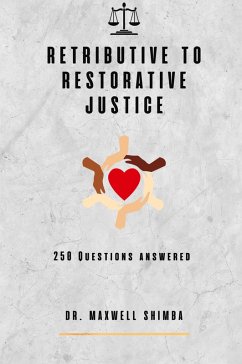Retributive to Restorative Justice In Retributive to Restorative Justice, Dr. Maxwell Shimba offers a compelling examination of two fundamentally different approaches to justice. Retributive justice, which has dominated most legal systems, focuses on punishing offenders as a means to uphold societal order and deter future crimes. Rooted in the principle of "an eye for an eye," this system prioritizes retribution over rehabilitation, emphasizing penalties proportional to the crime committed. Dr. Shimba critiques this model, arguing that it often fails to address the underlying causes of criminal behavior, leaving victims and communities without meaningful resolution or healing. In contrast, restorative justice presents a paradigm shift, emphasizing the repair of harm caused by wrongdoing. Dr. Shimba outlines how this approach brings together victims, offenders, and community members in a cooperative process aimed at healing and reconciliation. Rather than focusing solely on punishment, restorative justice seeks to rebuild relationships, restore community trust, and create opportunities for offenders to take responsibility and make amends. By addressing the root causes of criminal behavior and fostering dialogue, restorative justice provides a more comprehensive framework for resolving conflicts and achieving long-term societal harmony. One of the book's significant contributions is its exploration of the advantages and challenges of restorative justice. Dr. Shimba notes that restorative practices can reduce recidivism by encouraging accountability and providing offenders with tools for reintegration into society. For victims, restorative justice offers a platform to voice their experiences and needs, enabling a sense of closure and empowerment. However, he also acknowledges the difficulties in implementing restorative processes, particularly in cases where offenders are unwilling to participate or where societal systems are resistant to change. Dr. Shimba also examines the role of cultural contexts in shaping justice practices. He highlights restorative justice traditions in African and Asian communities, where conflict resolution often prioritizes reconciliation and community healing over punitive measures. Drawing on examples like traditional Tanzanian practices under King Mirambo, he demonstrates how restorative justice aligns with values of community solidarity and mutual responsibility. This perspective underscores the potential for restorative justice to resonate across diverse societies, offering culturally sensitive solutions to crime and conflict. The book further addresses the intersection of faith and justice, particularly the role of the church in advocating for restorative approaches. Dr. Shimba argues that faith communities are uniquely positioned to foster reconciliation and healing through their emphasis on forgiveness, compassion, and accountability. He explores how churches can collaborate with legal systems to promote restorative practices, creating programs that address the spiritual, emotional, and social dimensions of justice. In conclusion, Retributive to Restorative Justice is both a critique of traditional punitive systems and a visionary guide for adopting restorative practices. Dr. Maxwell Shimba combines theoretical insights with practical examples to illustrate the transformative potential of restorative justice. By advocating for a system that prioritizes healing over punishment, he challenges policymakers, communities, and individuals to rethink how justice is administered. The book is an essential resource for those seeking innovative and compassionate solutions to the challenges of crime and conflict resolution.
Hinweis: Dieser Artikel kann nur an eine deutsche Lieferadresse ausgeliefert werden.
Hinweis: Dieser Artikel kann nur an eine deutsche Lieferadresse ausgeliefert werden.








